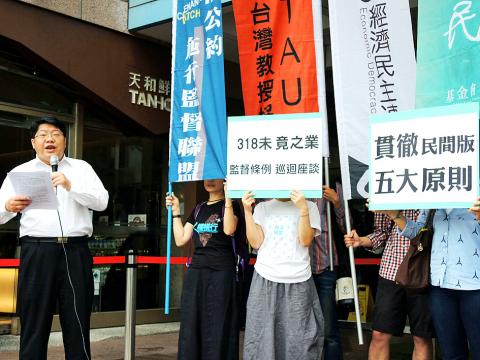Civil activists yesterday announced plans to hold local forums to pressure legislators on a draft bill to supervise cross-strait agreements, demanding that any review of the draft legislation be put on hold until after Democratic Progressive Party (DPP) president-elect Tsai Ing-wen (蔡英文) takes office.
About 10 protesters from the Economic Democracy Union, Democracy Tautin and other groups gathered in front of DPP headquarters in Taipei, calling on the party to remember the Sunflower movement, as the Legislative Yuan prepares to begin a review of a bill imposing new regulatory standards on negotiations with China.
“We should have come to DPP headquarters to ‘pound the table’ long ago, but we are not here to pound the table today,” Democracy Tautin general coordinator June Lin (林倢) said, referring to statements by Tsai that activists should not hesitate to engage in “table-pounding” if they feel the government is ignoring their views.

Photo: CNA
Activists last week promised to take action if the DPP refused to agree to talks and open debate over the supervisory bill, questioning the DPP draft legislation’s use of the word “area” to refer to Taiwan, as well as the exemption of the service trade agreement from the new requirements.
Forums announced yesterday are to target DPP members of the Legislative Yuan’s Internal Administration Committee — which is responsible for the supervisory bill’s initial review — demanding that legislators pass amendments to the legislation to reflect their demands.
“We will target the committee members — not just the DPP itself — because they have the real authority to determine the articles’ content, and influence between legislators and the party flows both ways,” Economic Democracy Union convener Lai Chung-chiang (賴中強) said. “We are willing to discuss the articles within the framework of the DPP’s official version, but politics by nature includes diversity.”
The DPP caucus has asked party lawmakers to withdraw individual versions of supervisory articles and support the party’s official version.
“I have to remind the DPP that ‘the same water which floats boats also sinks boats,’” he said, urging the party not to forget the Sunflower movement’s contributions to its victory in January’s elections and promising to begin “table-pounding” if the party fails to provide a response by Tsai’s inauguration on May 20.
Lai said that any review of the articles should be put on hold until Tsai takes office to allow for meaningful debate with the government officials who would be responsible for implementing the legislation.
Responding to the group’s invitation for a debate, DPP Legislator Lee Chun-yi (李俊俋) said he would not accept it.
“There are now seven different proposals [for the bill to monitor cross-strait agreements], and we should follow the Legislative Yuan’s due process by holding public hearings to collect opinions on the different versions,” Lee said. “The Economic Democracy Union’s criticism of the DPP and what they say are not always true.”
DPP Legislator Lai Jui-lung (賴瑞隆) echoed Lee’s view, saying that different opinions should be debated in legislative public hearings.
Additional reporting by Loa Iok-sin

Chinese Nationalist Party (KMT) Chairman Eric Chu (朱立倫), spokeswoman Yang Chih-yu (楊智伃) and Legislator Hsieh Lung-chieh (謝龍介) would be summoned by police for questioning for leading an illegal assembly on Thursday evening last week, Minister of the Interior Liu Shyh-fang (劉世芳) said today. The three KMT officials led an assembly outside the Taipei City Prosecutors’ Office, a restricted area where public assembly is not allowed, protesting the questioning of several KMT staff and searches of KMT headquarters and offices in a recall petition forgery case. Chu, Yang and Hsieh are all suspected of contravening the Assembly and Parade Act (集會遊行法) by holding

PRAISE: Japanese visitor Takashi Kubota said the Taiwanese temple architecture images showcased in the AI Art Gallery were the most impressive displays he saw Taiwan does not have an official pavilion at the World Expo in Osaka, Japan, because of its diplomatic predicament, but the government-backed Tech World pavilion is drawing interest with its unique recreations of works by Taiwanese artists. The pavilion features an artificial intelligence (AI)-based art gallery showcasing works of famous Taiwanese artists from the Japanese colonial period using innovative technologies. Among its main simulated displays are Eastern gouache paintings by Chen Chin (陳進), Lin Yu-shan (林玉山) and Kuo Hsueh-hu (郭雪湖), who were the three young Taiwanese painters selected for the East Asian Painting exhibition in 1927. Gouache is a water-based

Taiwan would welcome the return of Honduras as a diplomatic ally if its next president decides to make such a move, Minister of Foreign Affairs Lin Chia-lung (林佳龍) said yesterday. “Of course, we would welcome Honduras if they want to restore diplomatic ties with Taiwan after their elections,” Lin said at a meeting of the legislature’s Foreign Affairs and National Defense Committee, when asked to comment on statements made by two of the three Honduran presidential candidates during the presidential campaign in the Central American country. Taiwan is paying close attention to the region as a whole in the wake of a

OFF-TARGET: More than 30,000 participants were expected to take part in the Games next month, but only 6,550 foreign and 19,400 Taiwanese athletes have registered Taipei city councilors yesterday blasted the organizers of next month’s World Masters Games over sudden timetable and venue changes, which they said have caused thousands of participants to back out of the international sporting event, among other organizational issues. They also cited visa delays and political interference by China as reasons many foreign athletes are requesting refunds for the event, to be held from May 17 to 30. Jointly organized by the Taipei and New Taipei City governments, the games have been rocked by numerous controversies since preparations began in 2020. Taipei City Councilor Lin Yen-feng (林延鳳) said yesterday that new measures by